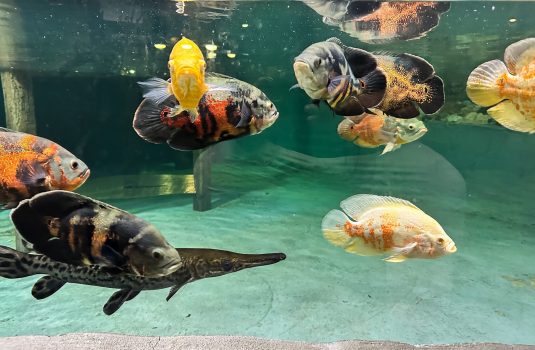Oscar
Common Name: Oscar
Scientific Name: Astronotus ocellatus
Names: N/A
Locations: Whitby & London

Diet
Oscars are carnivorous fish, primarily feeding on a diet consisting of small fish, insects, crustaceans, and occasionally plant matter.
Average lifespan
In captivity, Oscars can live around 10 to 15 years, though their lifespan may vary depending on factors such as diet, water quality, and tank conditions.
Size
Oscars are relatively large freshwater fish, with adults reaching lengths of up to 30 to 35 centimeters (12 to 14 inches) on average.
Weight
Adult Oscars can weigh anywhere from 1 to 2 kilograms (2.2 to 4.4 pounds).
About
Oscars are native to South America, particularly found in the Amazon River basin and its tributaries. They inhabit slow-moving rivers, lakes, and flooded forests, where they can find suitable food and shelter.
Size and behavior
Oscars have a deep, oval-shaped body and are known for their vibrant coloration and distinctive markings. They are territorial and aggressive fish, often defending their territory from intruders and competing for food. Oscars are also intelligent and can recognize their owners, displaying interactive behavior such as begging for food and following movements outside of the tank.
Diet and nutrition
Oscars are carnivorous predators and require a diet high in protein. In captivity, they can be fed a diet of commercially available pellet or flake food formulated specifically for cichlids, as well as live or frozen feeder fish, shrimp, and insects. Providing a varied diet ensures that they receive the necessary nutrients for growth, coloration, and overall health.
Conservation status
The conservation status of Oscars in the wild is not evaluated separately, as they are considered a species of least concern by the International Union for Conservation of Nature (IUCN). However, they may face threats from habitat destruction, pollution, and overfishing in some areas of their range.
Fun fact
Oscars are known for their ability to recognize their owners and display interactive behavior, such as begging for food or greeting their owners at the tank’s glass. They have distinct personalities and can form bonds with their caretakers, making them popular pets among aquarium enthusiasts.
Call or visit your local Reptilia Facility to learn how you can adopt one of these amazing reptiles.










